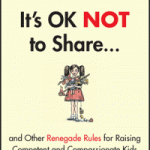By Heather Shumaker
My neighbor is a stay-at-home dad. When he heard I had written a parenting book – one that included chapter titles like “Ban Chairs – Not Tag” and “Bombs, Guns, and Bad Guys Allowed,” he perked right up. “I was always being told I was “bad” as a boy because I needed to move my body,” he said.
Movement, action and rough physical play are an essential part of early childhood, for boys and girls alike. Instead of banning high energy, find ways to welcome it.
 Here’s an excerpt from the book It’s OK Not to Share…And Other Renegade Rules for Raising Competent and
Here’s an excerpt from the book It’s OK Not to Share…And Other Renegade Rules for Raising Competent and
Compassionate Kids (Tarcher/ Penguin, 2012. Reprinted with permission). The book contains a whole section called “Running Room” which explores action, power and movement. This chapter celebrates roughhousing.
Renegade Rule 17 – Only punch your friends
Dan punches Leo, and Leo punches right back.
Nearby, an adult looks on, but doesn’t interrupt. These two four-year-olds are having fun. Dan and Leo are both wearing pint-sized boxing gloves, purple and red, and standing barefoot on a tumbling mat. They are giggling and having a marvelous time.
Renegade Reason – Roughhousing—even play boxing—is social and healthy. But it has no place if someone’s angry.
When I told a fellow mother that I was writing a book which included boxing at preschool, she was shocked. “Boxing? You’ve got to be kidding me. I spend my time trying to keep their hands OFF each other!”
That can be a problem. Young kids are physical creatures. They like body contact and have a deep need for touch. Especially since verbal skills are still developing, one of the ways children show interest in a friend is through physical contact, sometimes hugs, sometimes play fights.
Lee and Janet, the founders of my childhood preschool noticed this. They watched kids play and saw how much young kids liked to wrestle. Children would roll around together like little lions or puppies. They thought: if kids want to play that way there must be a reason. Well, why not? Lee and Janet equipped rooms with wrestling mats and boxing gloves. Rough-housing games blossomed into a 40-year tradition at the School for Young Children.
Rough-housing games, like boxing and wrestling, give kids outlets for high energy and boost friendships. But only when everyone is having fun. If someone’s angry, it’s not a game. Rough-housing is not a way to settle a conflict. Games should be between willing partners who are in a playful mood.
What’s more, it turns out that boisterous play like preschool boxing is not only a legitimate way to have fun, it also plays a positive, important role in child development.
Renegade Blessings
Rough-and-tumble play helps our kids grow on many levels. A child can learn:
– I’m strong and powerful.
– It feels good to use my body actively.
– I can make friends and take on new challenges.
– I can set limits on other people and stop something I don’t like.
– I can listen to my friends and know when to stop.
– I can cope, even if I get hurt a little bit.
– If someone gets hurt, we can make new rules so it doesn’t happen again.
Why it works
Whether it’s called rough-and-tumble play, boisterous play, horse play, puppy play, or rough-housing, this kind of play is a vital part of childhood. Rowdy puppy play helps bodies and brains develop. When two kids tussle on the floor, or roll around together, they are showing the need to wrestle. If we say ‘no’ to rough play, we are thwarting this need. Instead of issuing a ban (Get your hands off of him! Quit hitting your brother. I don’t want to see any bodies touching.) think how you can best meet this age-old need.
Horse play may look like out-of-control goofing off, but it serves a deeper purpose. Studies by Dr. Jaak Panksepp show that rough-and-tumble play helps to develop the brain’s frontal lobe including the prefrontal cortex. This is the area of the brain that commands Executive Function, controls impulses and regulates behavior. The more the prefrontal cortex is developed, the better kids do in all areas of life, whether it’s social, emotional, or academic. On-going research by Dr. Adele Diamond and others suggests that Executive Function is the top predictor of kids’ success.
Roughhousing Benefits
– Friendship
– Energy outlet
– Chance to experience power
– Impulse control
– Risk-taking
– Building brain power
– Body and spatial awareness
– Need for motion
– Need for physical touch
– Practice setting limits on peers
– Negotiating skills
– Building trust with peers
– Self-esteem
– Reading emotions
– Showing empathy
– Joy
Since this part of the brain is so important, is it really any surprise that kids develop it by doing simply what kids do best? Rolling about the floor and tussling with squawks of high excitement. Rough-and-tumble play must be welcomed.
As early educator Dan Hodgins puts it: “It’s just as important to rough house with kids as to read them a story.”
More on welcoming rough-and-tumble play into your family or classroom in It’s OK Not to Share, including:
– staging a wrestling match
– getting hurt
– setting kid-based rules
– winners and losers
– power actions
– welcoming movement
– benefits of risk
Heather Shumaker is the author of It’s OK Not to Share…And Other Renegade Rules for Raising Competent and Compassionate Kids (Tarcher/ Penguin, 2012). She’s a journalist, blogger, speaker and mother of two young children, whose work has appeared in Huffington Post, New York Post, Parenting, Pregnancy and Organic Gardening. She’s a frequent guest on radio and TV shows about writing and parenting, and blogs at Starlighting Mama. You can learn more about Heather’s book at www.heathershumaker.com.



